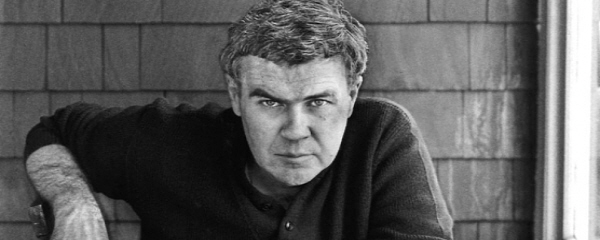Photo by Marion Ettlinger, Article by Paul Curd
One thing you soon surmise from reading Raymond Carver is that he was an alcoholic. Carver’s characters tend to drink excessively, and his stories often examine the negative impact of drinking on his central character’s relationships. But for the last eleven years of his life, Carver was sober, and it was in these sober years that he wrote what many believe to be his finest stories. But there’s more to this than simple drunkenness and sobriety. Nowadays, what we talk about when we talk about Carver is the role of the literary editor.
Carver was born on 25th May 1938 in Clatskanie, Oregon and brought up in Yakima, Washington. His father, a sawmill worker, was an alcoholic. In 1957, aged just 19, Carver married Maryann Burk. Their daughter was born six months later, and they had a son ten months after that. The following year, hoping it would help him get a better job to support his family, Carver enrolled at the Chico State College where he took an elective course, Creative Writing. The course director was Dr John Gardner. It was in 1960, under Gardner’s tutelage, that Carver wrote what was to become his first published story, ‘Furious Seasons’.
Carver was already drinking by the early sixties. His wife was drinking, too, and their married life was chaotic. Despite that, Carver’s story ‘Will You Please be Quiet, Please?’ was selected for the Best American Short Stories 1967 collection. The following year he met the arch-minimalist Gordon Lish, then the editor of a small press magazine. Lish liked ‘Will You Please be Quiet, Please?’ but said he would have given it a different ending if it had been his story. Carver is alleged to have said, ‘But it isn’t your story, is it, Gordon?’
In 1971, Carver’s story ‘Neighbours’ was published in Esquire magazine, where Lish was now Fiction Editor. Lish began to heavily edit and publish Carver’s stories but when Carver’s friends accused him of ‘selling out’ he claimed they were ‘still my stories’.
Carver’s collection of Lish-edited stories, Will You Please Be Quiet, Please? was published in 1976. His reputation grew, and he was particularly admired for his sparse, pared-down prose. The sense of mystery and of unspoken tension in his stories led them to be labelled as ‘minimalist fiction’. But the minimalism was down to Lish’s editing; Carver hated being called a minimalist.
Carver gave up drinking in June 1977. The following year he met the poet Tess Gallagher at a writers’ conference and in 1979 he left his wife and children to move in with her.
The collection What We Talk About When We Talk About Love was published in 1981, but Carver was increasingly unhappy with the way Lish edited his stories. In particular, a story that appeared in the collection as ‘The Bath’ was so severely cut back it had little left in common with Carver’s version. Carver wrote to Lish begging him to reinstate the original of this and other stories. The implication of his letter is that Carver no longer considered them to be ‘his’ stories.
By the time Carver published his next collection of short stories in 1983, Lish’s role was itself severely cut back. Cathedral includes some of Carver’s best stories, with many of the features of his earlier work, the same unflinching focus on the lives of blue-collar characters, a focus that came to be termed as ‘dirty realism’. But there is also a more humane, epiphanic element to these later stories. The collection includes ‘A Small, Good Thing’ – the original version of ‘The Bath’.
Carver married Tess Gallagher in 1988, a year after being diagnosed with lung cancer. He died six weeks later, on 2 August 1988, aged 50.
The publication of Cathedral was considered by many to signal a change in stylistic direction, of a new expansive Carver. Many critics attributed this ‘change’ to the fact Carver was now sober. But since we now understand more fully the role Gordon Lish played in reshaping Carver’s earlier work a number of assumptions need to be revised. How far did Carver’s prose style really change with sobriety? How much of an influence was Tess Gallagher on his later work? And was he ever, really, a minimalist?
Last year (2009), after much pressure from Gallagher, the unedited stories of What We Talk About When We Talk About Love were published under Carver’s original title, Beginners. It is clear that, sober, Carver was a great writer, even without Lish’s influence. But it is equally clear that the drunk Raymond Carver needed Gordon Lish’s editorial help. The relationship between Carver and his editor is intriguing. But with the apparent demise of the literary editor in the world of publishing, it’s more intriguing to wonder how a struggling Raymond Carver would fare today.
***********
Paul Curd is working towards an MA in Creative Writing at Canterbury Christ Church University. He has published had more than thirty short stories in the UK and abroad. His novel The Belfast Boy was shortlisted for the Crime Writers’ Association Debut Dagger Award.
